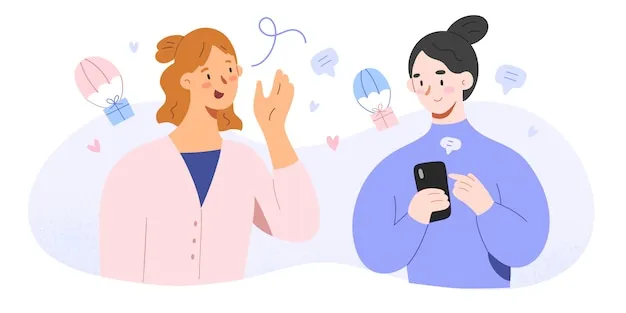Easy Conversation Starters You can Try
To overcome your fear and mentally prepare yourself before speaking, and there are several ways you can use to start conversations, make your life easier, and gain what’s in front of you:
1. Compliments: One of the best ways to get closer to anyone is to compliment them. For example, compliment a colleague on her beautiful shoes, then ask where she got them from, and the conversation will continue.
2. Trends: You can talk about a current event or trend that everyone is talking about, like a TV series or a match that was played yesterday. For example, say, “Did you watch yesterday’s match? Salah was amazing!” Their eyes will light up, and they’ll respond, continuing the conversation.
3. Dive into the topic right away: This method may not work well for someone who is very introverted because of their shyness and tendency to overthink before speaking. But you can start with a gentle smile, introduce yourself, and get to know them. It works better with more social people, especially if you’re working in a new place and want to get to know your colleagues and integrate with them.
4. Ask for help: You can ask your colleagues at work for help or ask for a specific service from someone to help you. Many people like to help others and feel useful. For example, ask a colleague at work to help you write the reports required of you. You’ll learn from them, and your conversation will be ongoing.
5. Share an experience: You can ask your colleague about an experience they’ve been through or ask them for advice in a specific situation that both of you have experienced. For example, if you’re working in a new place and want to know the work system there, the salaries, and whether the people there are nice or not, you can ask them, and they’ll tell you about their experience in that place or the procedures and paperwork required of you in a government place to license a car.
6. Ask for an opinion: You can ask your colleague for their opinion on a restaurant or café you visited, their opinion on the service and food, whether it’s worth it or not, or a clothing brand you tried. For example, ask them their opinion on a course they took if it was worth it and useful.
7. Weather news: I think there’s nothing easier than asking your colleague about today’s weather and telling them it’s very cold these days, and we’re all stuck at home. They’ll respond, and the conversation will continue.
8. Play together: You can easily suggest to your colleagues that you play together, which creates a nice atmosphere. People will respond to you, such as playing a quick game like Uno or any other game on a mobile app.
9. Social events: Weddings and gatherings are the best ways to meet new people, especially if you both know the bride or groom. Ask them if they’re relatives or friends and how they know each other.
10. Hobbies: You can ask them about their hobbies that they like to do in their spare time, like drawing, reading, or sports.
Continuing the Conversation
- Starting a conversation is easy, but keeping it going without awkward silences can be challenging. Here are some tips to help you maintain the flow:
- Listen more than you speak to give the person you’re talking to a chance to express themselves fully. Avoid interrupting; instead, let them speak and show that you’re actively listening. Also, try not to move your head too much; maintaining steady eye contact signals your engagement and respect.
- Look for common ground between you and the other person, such as shared interests, experiences, or opinions. This can be anything from a recent movie you both watched to a hobby you both enjoy.
- Ask open-ended questions that encourage the other person to elaborate on their thoughts and feelings. Avoid closed-ended questions that can be answered with a simple “yes” or “no,” as they can lead to dead ends in the conversation. By asking open-ended questions, you create opportunities for deeper discussions and connections.
- Choose the right timing to speak. Avoid initiating a conversation when the other person seems upset, tired, or preoccupied. Instead, look for moments when they appear receptive and open to engaging in dialogue.
Handling Rejection
- Facing rejection is a natural part of social interaction, and how you respond to it can significantly impact your self-esteem and future interactions. Here’s how to navigate rejection:
- Accept the rejection gracefully, acknowledging that not everyone will connect with you or share your sentiments. Avoid dwelling on the reasons behind the rejection or attempting to change the other person’s mind.
- Recognize and process your emotions without letting them overwhelm you. It’s normal to feel hurt, disappointed, or embarrassed after being rejected, but try not to dwell on these feelings indefinitely.
- Avoid internalizing the rejection as a reflection of your self-worth. Remind yourself that rejection is often situational and doesn’t diminish your value as a person.
- Take constructive steps to learn from the experience and grow. Consider whether there are areas where you can improve your communication skills or approach to social interactions.
- Engage in self-care activities that promote emotional well-being, such as spending time with supportive friends, pursuing hobbies you enjoy, or practicing mindfulness and relaxation techniques.
- Ultimately, view rejection as a learning opportunity that can help you refine your social skills and resilience for future interactions. By embracing rejection as a natural part of life, you’ll become better equipped to handle setbacks and navigate social dynamics with confidence and grace.
“People are treasures.” That’s why you shouldn’t stop trying to connect with others, and you should overcome your fear and shyness. Give them your time and attention, listen to them, and engage in conversation. Be kind and smile, and don’t be discouraged by rejection; it’s a natural part of life. What’s important is to learn from the experience, develop your personality and skills, and move forward.



